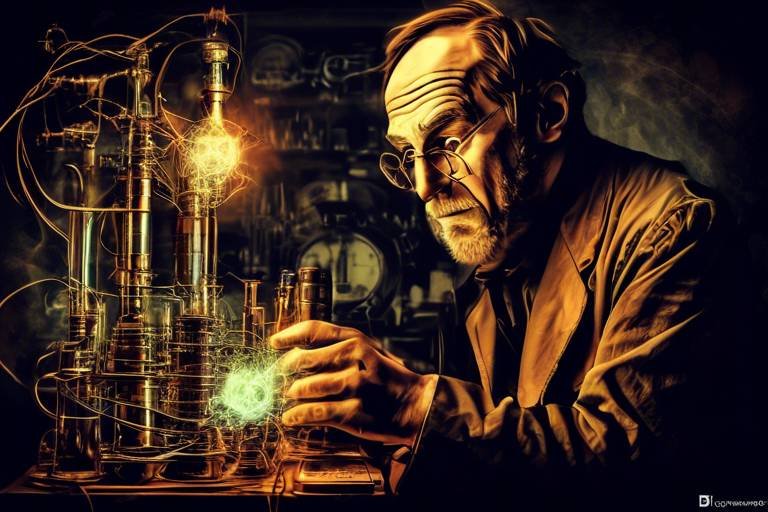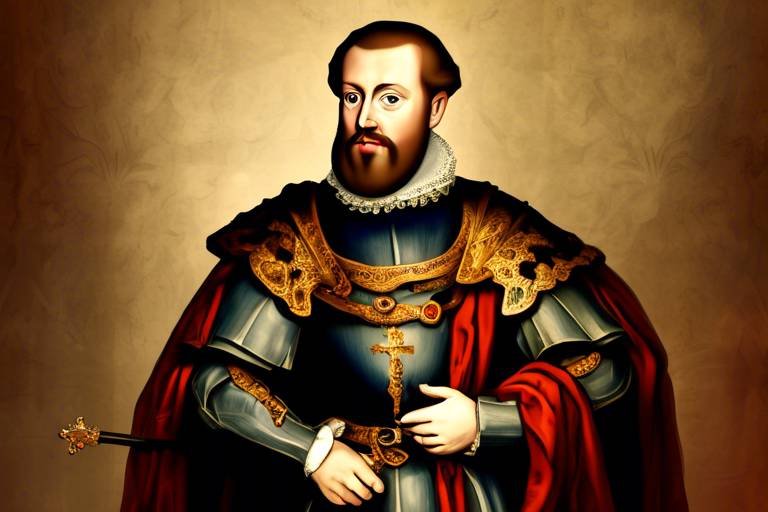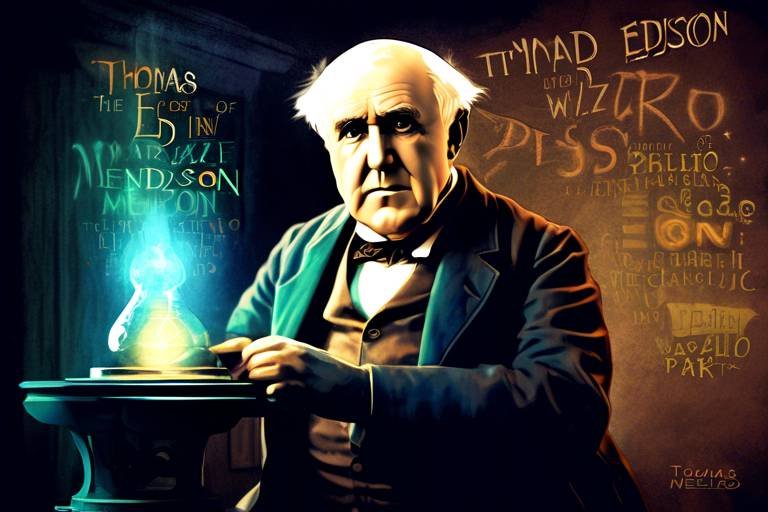Faraday: The Father of Electromagnetism
Michael Faraday, often hailed as the Father of Electromagnetism, was a trailblazing figure whose pioneering work laid the groundwork for numerous modern technologies that we rely on today. His profound contributions to the fields of electromagnetism and electrochemistry have left an indelible mark on the scientific world, shaping the way we harness and understand electricity and magnetism.

Early Life and Education
Michael Faraday, often referred to as the "Father of Electromagnetism," had a remarkable journey that began in humble surroundings. Born in 1791 in a working-class family in London, Faraday received only a basic education. Despite his limited formal schooling, his insatiable curiosity and keen interest in science drove him to self-educate and pursue his passion for understanding the natural world.
Faraday's early exposure to books and lectures on science sparked a fire within him, leading to his employment as a bookbinder's apprentice. During his time as an apprentice, he voraciously read scientific texts, laying the foundation for his future groundbreaking discoveries. Faraday's relentless pursuit of knowledge and hands-on experimentation set him apart as a self-taught scientist of exceptional talent.
His pivotal moment came when he attended a series of lectures by renowned chemist Sir Humphry Davy at the Royal Institution. Faraday's meticulous notes and boundless enthusiasm caught Davy's attention, eventually leading to his appointment as Davy's assistant. This marked the beginning of Faraday's remarkable career in science, where he would go on to make profound contributions to the fields of electromagnetism and electrochemistry.

Faraday's Law of Electromagnetic Induction
Faraday's Law of Electromagnetic Induction is a pivotal concept in the field of electromagnetism, credited to the innovative mind of Michael Faraday. This law states that a changing magnetic field induces an electromotive force, or EMF, in a conductor. This fundamental principle laid the groundwork for the development of generators and transformers, which are essential components in modern electrical systems.
Faraday's groundbreaking experiments in the early 19th century demonstrated the relationship between magnetism and electricity, leading to the discovery of electromagnetic induction. By moving a magnet near a conductor, Faraday observed the generation of an electric current. This discovery revolutionized the understanding of electromagnetism and paved the way for the practical application of electrical power generation.
Through his meticulous experimentation, Faraday showed that the interaction between magnetic fields and conductors could produce a flow of electric current. This phenomenon, known as electromagnetic induction, is the basis for the operation of generators that convert mechanical energy into electrical energy. Moreover, Faraday's work on electromagnetic induction laid the foundation for the development of transformers, which are crucial for transmitting electricity efficiently over long distances.
One of the key implications of Faraday's Law of Electromagnetic Induction is the concept of self-inductance, where a changing current in a circuit induces a voltage in the same circuit. This phenomenon is utilized in the design of inductors, which are essential components in electronic circuits for storing and releasing energy.
Faraday's Law of Electromagnetic Induction not only revolutionized the field of electromagnetism but also had far-reaching implications for technology and society. By harnessing the principles elucidated by Faraday, engineers and scientists have been able to develop sophisticated electrical systems that power our modern world.

Faraday's Experiments on Electricity
Faraday's Experiments on Electricity were a series of groundbreaking investigations that revolutionized the understanding of electromagnetism. Michael Faraday's relentless curiosity and innovative approach to scientific inquiry led him to conduct a range of experiments that revealed the intricate relationship between electricity and magnetism, setting the stage for modern electrical technology.
One of Faraday's most famous experiments involved moving a magnet in and out of a coil of wire. Through this simple yet ingenious setup, he discovered electromagnetic induction, demonstrating that a changing magnetic field could generate an electric current in the wire. This fundamental principle laid the groundwork for the development of generators and transformers, essential components of today's electrical systems.
In another key experiment, Faraday investigated the phenomenon of electromagnetic rotation. By passing an electric current through a wire suspended in a magnetic field, he observed the wire's rotation, proving the connection between electricity and magnetism. This discovery was pivotal in advancing the understanding of electromechanical interactions and paved the way for the development of electric motors.
Faraday's exploration of electrochemistry also played a crucial role in his experiments on electricity. His work on electrolysis, the process of using electricity to decompose chemical compounds, provided valuable insights into the relationship between electricity and chemical reactions. Faraday's laws of electrolysis, which quantitatively describe the amount of substances produced during electrolysis, remain foundational in the field of electrochemistry.
Through his meticulous and methodical approach to experimentation, Faraday not only uncovered fundamental principles of electromagnetism but also demonstrated the power of hands-on investigation in scientific discovery. His experiments on electricity not only expanded the frontiers of knowledge but also inspired generations of scientists to explore the wonders of the natural world.

Faraday's Chemical Discoveries
Michael Faraday, known for his groundbreaking work in electromagnetism, also made significant contributions to the field of chemistry. One of his notable chemical discoveries was the identification of benzene. Through his meticulous experiments, Faraday isolated and characterized this important aromatic compound, laying the foundation for further research in organic chemistry.
In addition to his work on benzene, Faraday's exploration of electrolysis was revolutionary. He formulated the laws of electrolysis, which govern the process of chemical decomposition through the passage of an electric current. Faraday's experiments in electrochemistry not only advanced the understanding of chemical reactions but also paved the way for the development of electrochemical technologies.

Faraday Cage and Electrochemistry
Faraday's work in the field of electromagnetism not only revolutionized our understanding of electricity but also led to practical inventions that are still relevant today. One of his notable contributions is the invention of the Faraday cage, a device designed to block electromagnetic fields. This cage acts as a shield, protecting its contents from external electromagnetic interference. It is widely used in various industries, including electronics, telecommunications, and medical equipment, to ensure the proper functioning of sensitive devices.
Moreover, Faraday's research in electrochemistry laid the foundation for modern advancements in this field. By studying the relationship between electricity and chemical reactions, he made significant discoveries that continue to influence scientific research today. His work on electrolysis, for example, provided crucial insights into the process of breaking down compounds using electrical energy, a principle that is still applied in various industrial processes.
Faraday's contributions to electrochemistry also extended to the development of fundamental laws that govern chemical reactions. Through his experiments, he formulated the laws of electrolysis, which describe the quantitative relationship between the amount of substances produced during electrolysis and the amount of electricity passed through the system. These laws not only advanced our understanding of chemical processes but also paved the way for future discoveries in the field of electrochemistry.

Legacy and Impact on Science
Michael Faraday's legacy in the scientific community is profound, with his contributions spanning across the fields of physics and chemistry, shaping the course of modern science. His pioneering work in electromagnetism and electrochemistry continues to influence researchers and engineers to this day. Faraday's relentless curiosity and innovative spirit laid the groundwork for numerous technological advancements, from electric power generation to the development of motors and generators.
One of the key aspects of Faraday's impact on science is his emphasis on practical experimentation and observation. He believed in the power of hands-on exploration and was known for his meticulous attention to detail in his experiments. By bridging the gap between theory and application, Faraday's work not only expanded scientific knowledge but also paved the way for practical applications of his discoveries.
Faraday's theoretical insights, despite his lack of formal mathematical training, were ahead of his time and continue to inspire scientists today. His intuitive understanding of electromagnetic phenomena laid the foundation for James Clerk Maxwell's equations, which revolutionized the field of electromagnetism. Faraday's ability to grasp complex concepts through experimentation and observation showcases the power of hands-on learning and the importance of thinking outside the box in scientific inquiry.
Throughout his lifetime and beyond, Faraday received numerous honors and recognitions for his groundbreaking contributions to science and technology. His work was celebrated not only for its immediate impact but also for its long-lasting influence on the development of modern physics and chemistry. Faraday's legacy serves as a reminder of the transformative power of scientific exploration and the enduring impact that one individual can have on the course of human knowledge.

Faraday's Theoretical Insights
Faraday's theoretical insights were truly remarkable, considering his lack of formal mathematical training. Despite this, he possessed an intuitive understanding of electromagnetic phenomena that paved the way for future advancements in the field. Faraday's experiments and observations led him to propose groundbreaking concepts that influenced the development of Maxwell's equations, a cornerstone of electromagnetism.
One of Faraday's key insights was his concept of lines of force, which he used to describe the behavior of electric and magnetic fields. This visual representation was a significant departure from the prevailing mathematical approach at the time, showcasing Faraday's unique perspective on the nature of electromagnetic interactions.
Faraday's theoretical framework also extended to his exploration of electromagnetic induction, where he postulated the existence of a magnetic field surrounding a current-carrying conductor. This concept laid the foundation for the development of transformers and other essential electrical devices, demonstrating Faraday's foresight and innovative thinking.
Furthermore, Faraday's emphasis on the qualitative aspects of electromagnetism, rather than quantitative measurements, allowed him to form conceptual models that were ahead of his time. His ability to envision complex phenomena in a simple and intuitive manner set him apart as a visionary in the field of science.

Faraday's Honors and Recognition
Michael Faraday, often referred to as the "Father of Electromagnetism," received numerous honors and recognitions for his groundbreaking contributions to science. Despite his humble beginnings and lack of formal education, Faraday's work revolutionized the fields of physics and chemistry, leaving a lasting impact on the scientific community.
One of the most prestigious honors Faraday received was being elected as a Fellow of the Royal Society in 1824, recognizing his exceptional talents and achievements in the field of science. This membership solidified his reputation as a respected scientist among his peers and provided him with a platform to further showcase his revolutionary experiments and discoveries.
In 1825, Faraday was awarded the Royal Society's prestigious Copley Medal for his groundbreaking research on electromagnetic induction, a concept that laid the foundation for modern electrical technologies. This recognition highlighted the significance of Faraday's work and cemented his legacy as a pioneer in the field of electromagnetism.
Faraday's contributions to science were also honored with the Albert Medal by the Royal Society of Arts in 1846, in recognition of his innovative experiments in electricity and magnetism. This award underscored Faraday's role in advancing scientific knowledge and his dedication to pushing the boundaries of traditional scientific thinking.
Throughout his career, Faraday received numerous accolades and honors from prestigious institutions and organizations, celebrating his profound impact on the scientific world. His legacy continues to inspire generations of scientists and researchers, showcasing the enduring relevance of his discoveries and the enduring impact of his pioneering work in electromagnetism and electrochemistry.
Frequently Asked Questions
- What were Michael Faraday's major contributions to science?
Michael Faraday made significant contributions to the fields of electromagnetism and electrochemistry. His most notable discoveries include Faraday's Law of Electromagnetic Induction, the invention of the Faraday cage, and pioneering work on electrolysis and the laws of electrolysis.
- How did Faraday's experiments on electricity impact modern technology?
Faraday's experiments on electricity laid the foundation for the development of generators, transformers, and electric motors. His work revolutionized the understanding of electromagnetism and paved the way for modern technologies such as electric power generation.
- What is the Faraday cage and why is it important?
The Faraday cage, invented by Michael Faraday, is a shielded enclosure that blocks electromagnetic fields. It is crucial for protecting sensitive electronic equipment from electromagnetic interference, ensuring their proper functioning and security.
- How did Faraday's theoretical insights influence future scientific discoveries?
Despite his lack of formal mathematical training, Faraday had an intuitive understanding of electromagnetic phenomena that inspired future scientists. His insights played a significant role in the development of Maxwell's equations, which are fundamental in the field of electromagnetism.
- What honors and recognition did Faraday receive for his contributions to science?
Michael Faraday was widely honored during his lifetime and posthumously for his immense contributions to science and technology. He received prestigious accolades and awards, recognizing his pioneering work in electromagnetism, electrochemistry, and chemistry.



















